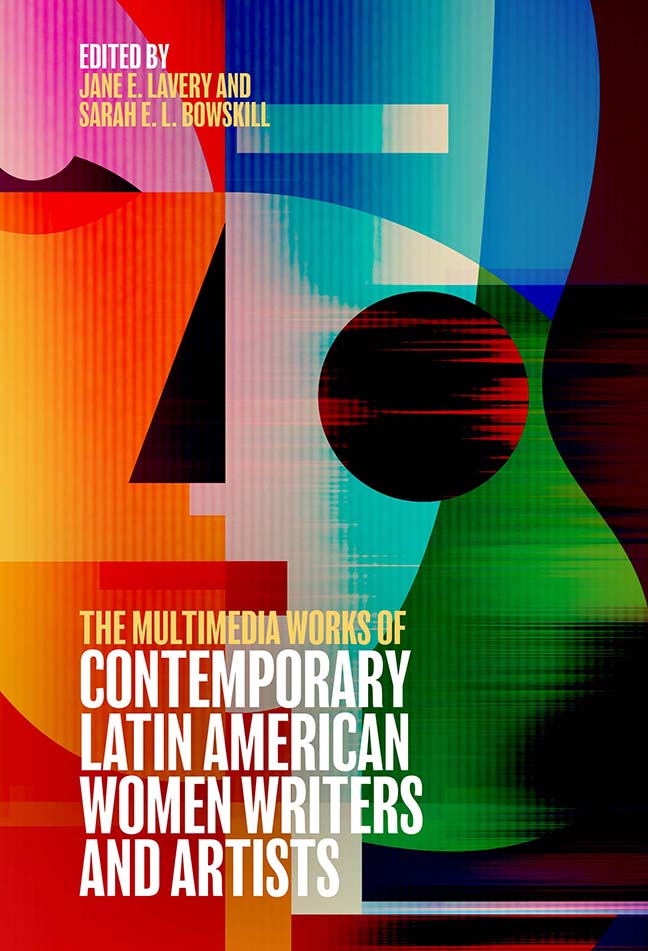Book contents
- Frontmatter
- Contents
- List of Illustrations
- List of Contributors
- Acknowledgments
- Introduction: A Crosscurrent of Contemporary Latin American Women Multimedia Writers and Artists
- 1 The Transliterary: The Novel and Other Multimedia Horizons Beyond (and Close to) the Textual
- 2 Commentary on Fe/males: Sieges of the Post Human (Transmedia Installation)
- 3 An Anthropophagic Ch’ixi Poetics
- 4 My Relationship with Artistic Creation Began with Words
- 5 Imagetext
- 6 Voices/Bodies
- 7 Redefining Meaning: The Interweaving of the Visual and Poetic
- 8 The Territory Is Home
- 9 Reflections on a Multimedia Practice
- 10 Digital Weaving
- 11 Eli Neira, Regina José Galindo, and Ana Clavel: “Polluting” Corporealities and Intermedial/Transliterary Crossings
- 12 The Digital Condition: Subjectivity and Aesthetics in “Fe/males” by Eugenia Prado Bassi
- 13 The Transmedia, Post-Medium, Postnational, and Nomadic Projects of Pilar Acevedo, Rocío Cerón, and Mónica Nepote
- 14 The Art of the Hack: Poets Carla Faesler and Mónica Nepote and Booktuber Fátima Orozco
- 15 The Places of Pain: Intermedial Mode and Meaning in Via Corporis by Pura López Colomé and Geografía del dolor by Mónica González
- 16 Words, Memory, and Space in Intermedial Works by Gabriela Golder and Mariela Yeregui
- 17 Fungibility and the Intermedial Poem: Ana María Uribe, Belén Gache, and Karen Villeda
- 18 Hypertext and Biculturality in Two Autobiographical Hypermedia Works by Latina Artists Lucia Grossberger Morales and Jacalyn Lopez Garcia
- 19 Dialogues Across Media: The Creation of (New?) Hybrid Genres by Belén Gache and Marina Zerbarini
- Bibliography
- Index
- Tamesis
6 - Voices/Bodies
Published online by Cambridge University Press: 17 December 2023
- Frontmatter
- Contents
- List of Illustrations
- List of Contributors
- Acknowledgments
- Introduction: A Crosscurrent of Contemporary Latin American Women Multimedia Writers and Artists
- 1 The Transliterary: The Novel and Other Multimedia Horizons Beyond (and Close to) the Textual
- 2 Commentary on Fe/males: Sieges of the Post Human (Transmedia Installation)
- 3 An Anthropophagic Ch’ixi Poetics
- 4 My Relationship with Artistic Creation Began with Words
- 5 Imagetext
- 6 Voices/Bodies
- 7 Redefining Meaning: The Interweaving of the Visual and Poetic
- 8 The Territory Is Home
- 9 Reflections on a Multimedia Practice
- 10 Digital Weaving
- 11 Eli Neira, Regina José Galindo, and Ana Clavel: “Polluting” Corporealities and Intermedial/Transliterary Crossings
- 12 The Digital Condition: Subjectivity and Aesthetics in “Fe/males” by Eugenia Prado Bassi
- 13 The Transmedia, Post-Medium, Postnational, and Nomadic Projects of Pilar Acevedo, Rocío Cerón, and Mónica Nepote
- 14 The Art of the Hack: Poets Carla Faesler and Mónica Nepote and Booktuber Fátima Orozco
- 15 The Places of Pain: Intermedial Mode and Meaning in Via Corporis by Pura López Colomé and Geografía del dolor by Mónica González
- 16 Words, Memory, and Space in Intermedial Works by Gabriela Golder and Mariela Yeregui
- 17 Fungibility and the Intermedial Poem: Ana María Uribe, Belén Gache, and Karen Villeda
- 18 Hypertext and Biculturality in Two Autobiographical Hypermedia Works by Latina Artists Lucia Grossberger Morales and Jacalyn Lopez Garcia
- 19 Dialogues Across Media: The Creation of (New?) Hybrid Genres by Belén Gache and Marina Zerbarini
- Bibliography
- Index
- Tamesis
Summary
“Is not the voice always already intervening, as a sounded body that searches for its place, one that projects forward to incite response? An intervention with great resonance, and one lodged within the power dynamics of particular structures – linguistic, familial, pedagogic governmental etc. A voice that is subsequently often overheard, underrepresented and interrupted.”
Brendon LabelleI don't write structured poems.
That's what I said, responding to a certain question the other day.
It would be arrogant
I thought.
No. I don't write structured poems because I am
investigating writing and the body
Not starting from writing that speaks about or reflects upon the
body.
I write from the body
and that is, in itself a question, not a certainty.
Some time ago I began to feel that that the practice of writing was a process that was becoming too intellectualized, it's not that I did not recognize the value of that but it was not what I thought about/or searched for/or was inspired by. It's not that I want to be new, no one is new (although, paradoxically, we are new, because all of us are a body that grows old, some are female bodies [some female bodies have been raped, and bodies of all genders have been disappeared]).
How can we fix writing if nothing is fixed and life has the tendency to disappear in a political system in which it is Not life but death that governs.
We cannot speak of language without language, we cannot think of bodies without bodies.
Voice is my writing, subjectivities, technologies of the self, yes but the construction of the voice, questioning.
That exploration has led me to use technology such as recording surfaces, loops, blurs, voices that are duplicated, obsessive ideas, tones of the voice that I want to use as material, without meaning or words just sounds, a voice not exploited by being put in order or given meaning. In that sense I have felt my body, I have positioned it in the center of the space in an act of remediation. The writer, male or female, is alone when they write. Are they alone? That act of writing has a body that is then rubbed out.
- Type
- Chapter
- Information
- Publisher: Boydell & BrewerPrint publication year: 2023

